David Isaacs & Chelsea Camille
David Isaacs, guitar
Chelsea Camille, soprano
Today’s Program
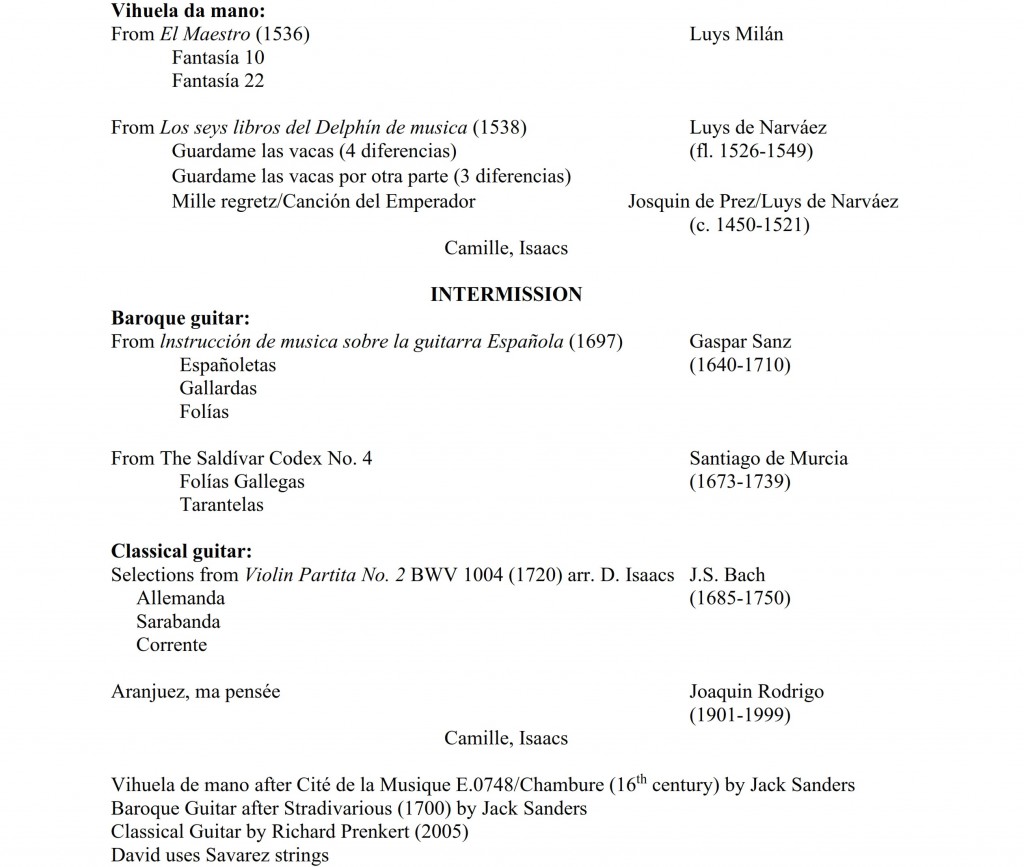

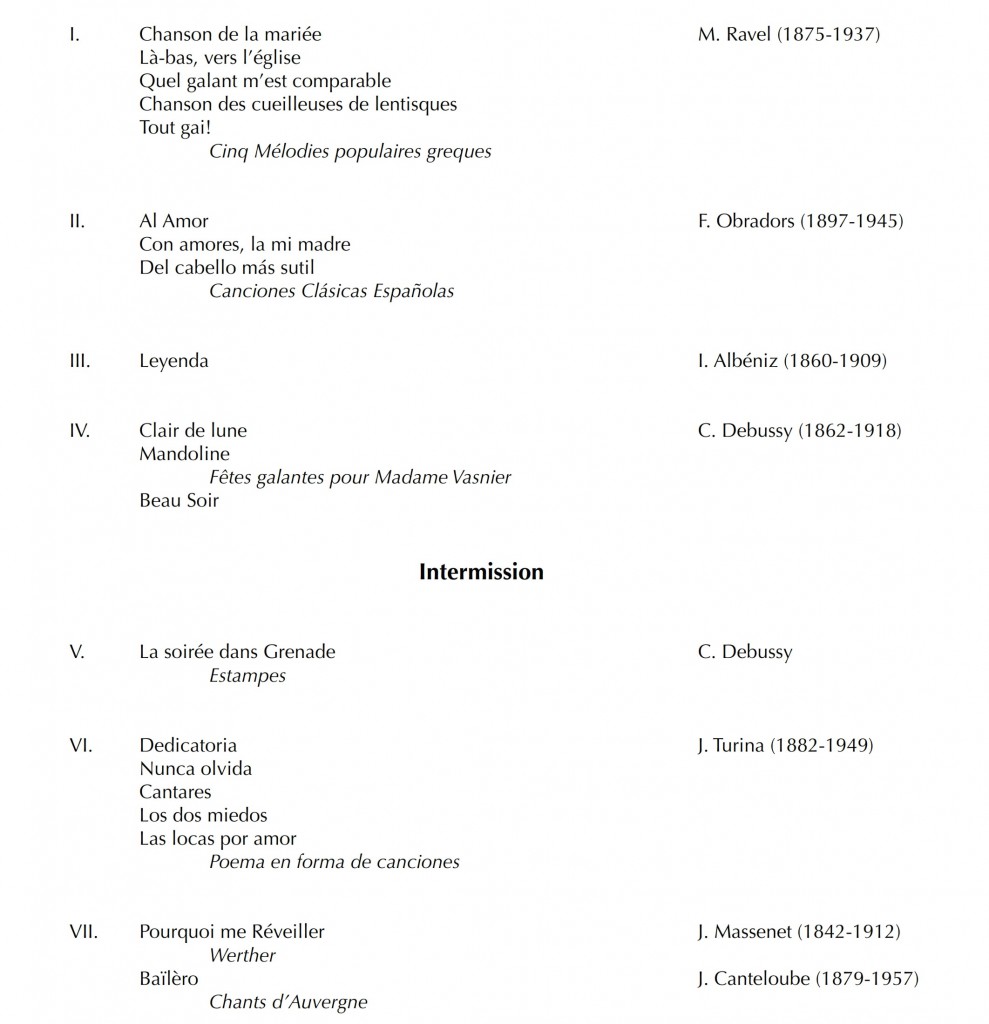
Wolfgang Amadeus Mozart
Violin Sonata No.33 in E-flat Major, KV. 481
Rondo from Serenade for Orchestra in D Major, K 250 (“Haffner”) (arr. Fritz Kreisler)
Manuel Ponce
Estrellita (arr. Jascha Heifetz)
Ennio Morricone
Love Theme from Cinema Paradiso
Ernest Chausson
Poème
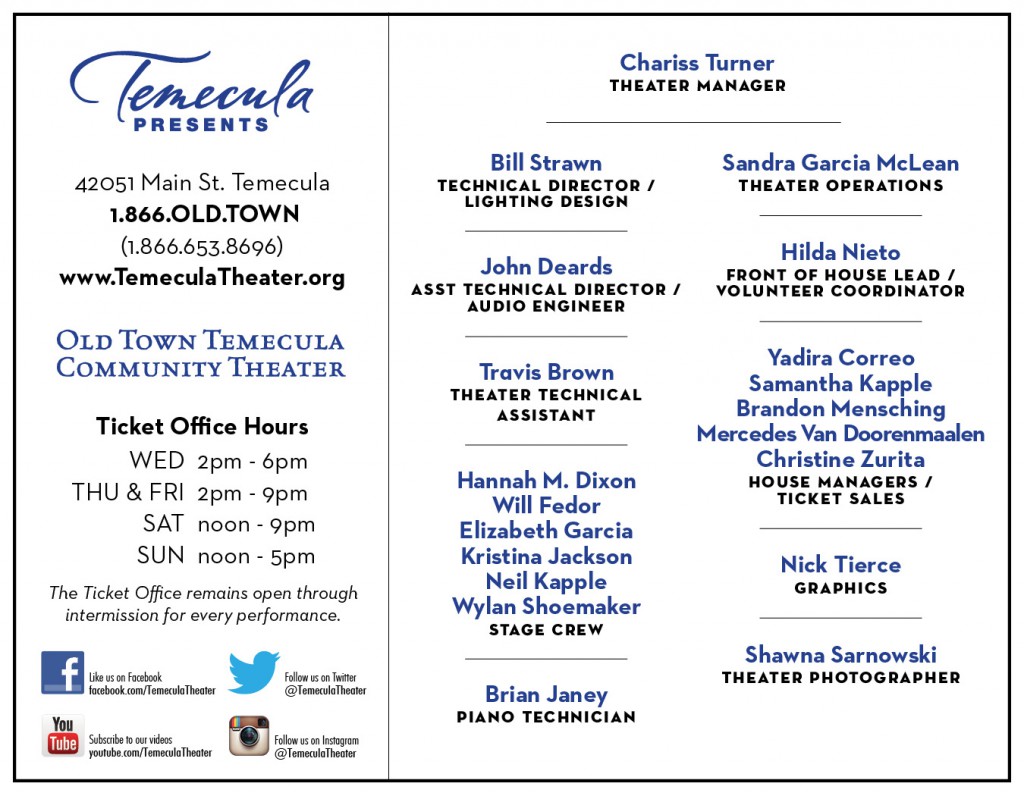
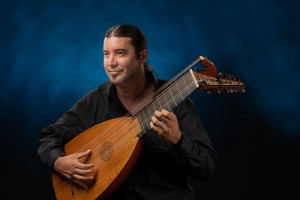 Eric Dickerson
Eric Dickerson
Sylvius Leopold Weiss (1687 – 1750)
Sonata in F (SW1)
INTERMISSION
Sylvius Leopold Weiss
Sonata in D Minor (SW11)

Volunteer as an usher at the Old Town Temecula Community Theater
Trio #3, Op 61 for Flute, Clarinet, and Bassoon by Francois Devienne (1759-1803)
Allegro espressivo
Presto non troppo
Sonata for Clarinet and Bassoon by Francis Poulenc (1899-1963)
Allegro
Romance
Final
The Fog is Lifting for Flute and Harp by Carl Nielsen (1865-1931)
Pastorales de Noel for Flute Bassoon and Harp by Andre Jolivet (1905-1974)
L’Etoile
Les Mages
La Vierge et L’Enfant
Entree et Danse des Bergers
Intermission
Variations on a Theme by Mozart for Harp by Mikhail Glinka (1804-1857)
Premiere Valse Op. 83 for Harp by August Durand (1830-1909)
Duos for Flute and Clarinet by Robert Muczynski (1929-2010)
Andante sostenuto
Allegro risoluto
Moderato
Allegro ma non troppo
Andante molto
Allegro
London Trio #1 for Flute, Clarinet, and Bassoon by Franz Joseph Haydn (1732-1809)
Allegro moderato
Andante
Finale-Vivace

Volunteer as an usher at the Old Town Temecula Community Theater
Ludwig van Beethoven (1770 – 1827)
Duo in B Flat for Clarinet and Bassoon, WoO 27 (c. 1800)
Hector Villa-Lobos (1887 – 1959)
Bachianas Brasileiras No. 6, W392 (c. 1938)
Eugene Bozza (1905 – 1991)
Sonatine (c.1938)
Intermission
Jonathan Ortega (b. 1986)
Duet for Old Friends (c. 2022)
George Frederick Handel (1685 – 1759)
Sonata in F Major, HWV 369 (arr. for flute and bassoon) (c.1722)
Francois Couperin (1668-1733)
Le rossignol en amour (from Pieces de Clavecin III) (c.1722)
Jean Francaix (1912-1997)
Sept Impromptus (c.1977)
1. Allegretto con spirito
2. Grave
4. Grazioso
7. Vivo

Volunteer as an usher at the Old Town Temecula Community Theater

Sunday, April 30, 2023, 3:00 p.m.
Gershwin Performing Arts Center | Murrieta Mesa High School
Frank Bridge (1879 – 1941)
Suite for String Orchestra
1. Prelude
2. Intermezzo
3. Nocturne
4. Finale
Maurice Ravel (1875 – 1937)
Le Tombeau de Couperin
1. Prelude
2. Forlane
3. Menuet
4. Rigaudon
INTERMISSION
Victoria Bond (b. 1945)
Bridges
1. Railroad Trestle Bridge, Galax, Virginia
2. Stone Bridge Over a Reflecting Pool in Suzhou
3. Golden Gate Bridge
4. Brooklyn Bridge
5. Mackinac Bridge
Claude Debussy (1862 – 1918), orch. Henri Büsser (1907)
Petite Suite
1. En bateau
2. Cortege
3. Menuet
4. Ballet
Thanks to the Murrieta Valley Unified School District for their support of this concert.
Concession sales benefit the Murrieta Educational Foundation for the Arts.
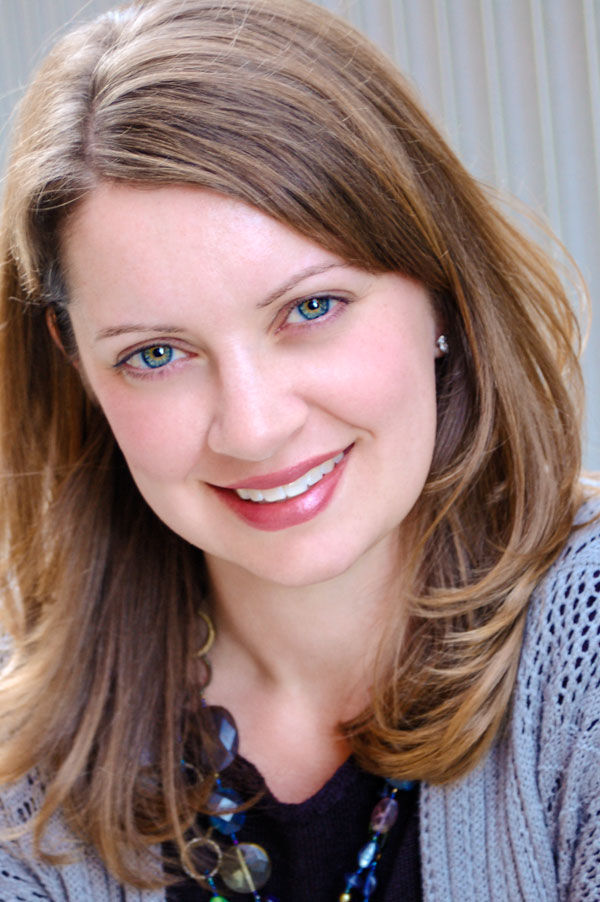
Dana Zimbric is marking her 13th season as Artistic Director and Conductor of the California Chamber Orchestra.
In addition to her work with us, she is Music Director of the Classics Philharmonic Orchestra, which performs educational programs for San Diego area students, and recently made her conducting debut with the San Diego Symphony.
Dana’s past conducting experience includes positions with the San Diego Youth Symphony, Avante Chamber Orchestra, Orchestra Nova San Diego, and the University of Wisconsin Chamber and Symphony Orchestras.
An accomplished clarinetist, Dana holds a Bachelor of Music in Clarinet Performance and a Master of Music in Orchestral Conducting from the University of Wisconsin. She lives in San Diego with her husband and two young daughters.
Kathryn Hatmaker (Concertmaster)
Nicole Sauder
Sarah Schwartz
Angela Xing
Ai Awata (Principal)
Isaac Allen
Margeaux Maloney
Victoria Bietz
Ethan Pernela (Principal)
Linda Piatt
Greg Perrin
Chia-Ling Chien (Principal)
Margaret Tait
Nathan Walhout
PJ Cinque
Michael Molnau
Pam Martchev (Principal)
Teresa Perrin
Rong-Huey Liu (Principal)
Austyn Estey-Ang
Frank Renk (Principal)
Sheryl Renk
Leyla Zamora (Principal)
David Savage
Darby Hinshaw (Principal)
Tricia Skye
Jonah Levy (Principal)
Rachel Allen
David Whitman (Principal)
Andy Watkins
Elena Mashkovtseva (Principal)
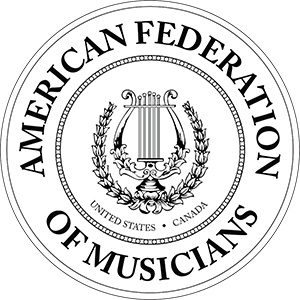
California Chamber Orchestra musicians in this concert are members of
The American Federation of Musicians, Local 325
The California Chamber Orchestra concludes our 17th season with Bridges – a journey of musical connections across time and place.
The first work on the program is the Suite for String Orchestra by English composer Frank Bridge (1879-1941). Bridge was a violinist, composer, conductor, pianist, and violist who is best known for his famous composition student Benjamin Britten. Bridge’s Suite for String Orchestra was written in 1909-1910, shortly after he married violinist Ethel Sinclair, whom he had met while a student at the Royal College of Music. Bridge’s Suite has four movements, each with a distinct character. The Prelude is slow and serious, with a recurring theme throughout the movement. The Intermezzo is light-hearted and melodic. The Nocturne is contemplative and timeless. The upbeat, jovial Finale includes thematic material from the first three movements to tie the piece together.
In 1914, French composer Maurice Ravel (1875-1937) was thirty-nine years old and had just been accepted into military service to fight in World War I. One month into the job he wrote to a friend about a new piano piece he had started which would be based on a French Suite. This was the beginning of Le tombeau de Couperin (the tomb of Couperin). When Ravel was discharged from the service in 1917, following the death of his mother earlier that year, the weight of the tragedy of war and his family loss affected him greatly. His music became his medium of healing and a way to process what he had seen and experienced. His simple piano work from 1914 was inspired by 18th century composer Francois Couperin and paid tribute to victims of World War I. Each of the six movements of Ravel’s score was dedicated to a friend who died at the front. Ravel orchestrated four of the movements in 1919.
The next work on the program is by composer and conductor Victoria Bond (b. 1945). Bond is the first woman awarded a doctorate in orchestral conducting from the Juilliard School where she also received her Master’s degree. She holds a Bachelor’s degree from the University of Southern California. Bond is principal guest conductor of Chamber Opera, Chicago and has guest conducted major orchestras throughout the world. About her piece, she writes:
The five movements of Bridges are inspired by actual bridges in different parts of the world and organized around a wide variety of cultures. Railroad Trestle Bridge in Galax, Virginia uses the motoric rhythm of a train and the sound of a fiddle and banjo playing country music. Stone Bridge over a Reflecting Pool in Suzhou is based on a traditional Chinese song called Moli Hua or Jasmine Flower. The Golden Gate Bridge recalls the folk music revival of the 1960’s and 70’s in California, with particular respect paid to the singer Joan Baez, whose haunting songs had a profound effect on me. I have combined her song “All My Trials” with a Chinese folksong called “Liu Yang River” as both reflect the culture of the Bay Area. The Brooklyn Bridge has a particularly happy coincidence. I wanted this bridge to partake of the vibrant be-bop era in New York City. In researching be-bop melodies, I came across a standard favored by many jazz musicians, “I Got Rhythm” by George Gershwin. Using only the harmonic chord changes to this tune, players crafted seemingly endless improvisations. As the song was written in the typical AABA song form, the “B” section was referred to as the “bridge”. Here was the ideal confluence of the many meanings of the word “bridge”, and I leaped at the opportunity to bring them all together. The fifth movement is The Mackinac Bridge, based on the folksong “The Water is Wide” because the bridge is the longest suspension bridge in the western hemisphere and spans a wide expanse of water over the straits of Mackinac, connecting Michigan’s upper and lower peninsulas. -Victoria Bond
Claude Debussy’s (1862-1918) Petite Suite, originally for piano four-hands, is one of his most popular pieces. The suite was written between 1886 and 1889, just as the French composer was starting his professional career. Debussy’s friend and conductor Henri Büsser transcribed the piece for chamber orchestra in 1907. The piece is in four parts, each movement capturing a different scene. The first two movements were inspired by poems of Debussy’s favorite poet Verlain. The first, “En Bateau” (In A Boat), depicts a boat gliding upon the moonlit water with its long melody above rolling harmonies. The second movement, “Cortege” (Procession) depicts a fine lady who receives lustful glances by her attendants. Debussy’s easygoing opening march-like theme captures a jovial mood for this procession. The third and fourth movements do not appear to have direct connections to Verlain’s poetry but continue in a similar mood. The Menuet is dreamy and the Ballet lighthearted and upbeat.
— Dana Zimbric
Judy Call
Prudhomme Associates, CPAs
City of Temecula
Leslie and Joseph Waters
Mark Margolin
Nicola Helm & Stephen Ryder
Craig Carper, LaPointe Wealth Management
Murrieta Rotary
Susan & Ken Dickson
Walt Fidler
John Stubbs
Barry Weiss
Rudy Wokoek
Kiyoe MacDonald
John Welniak
Candace Flint
Susan Humphrey
Sarah Ivar
Martha Minkler
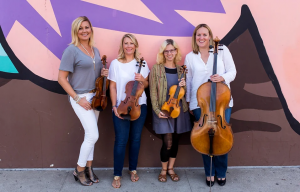
Rhiannon Giddens (Arr. Jacob Garchik)
At the Purchaser’s Option with variations
Franz Joseph Haydn
String Quartet Op. 33 No. 3 “The Bird”
Allegro moderato
Scherzo, Allegretto
Adagio ma non troppo
Finale, Presto
Ludwig van Beethoven
String Quartet No. 15 in A minor Op. 132
Molto adagio
Danish String Quartet
Last Leaf
Shore
Polska from Dorotea
Tjønneblomen
Menuet no. 60
Æ Rømeser
Intermezzo
Shine You No More
Rhiannon Giddens’ At the Purchaser’s Option with variations is an instrumental variation of a song from her album Freedom Highway (Nonesuch, 2017), arranged by Jacob Garchik. She wrote the song after finding in a book a 19th-century advertisement for a 22-year-old female slave whose 9-month-old baby was also for sale, but “at the purchaser’s option.” This piece comes from that advertisement, and from thinking about what that woman’s life might have been like. This piece was commissioned for Fifty for the Future: The Kronos Learning Repertoire, a project of the Kronos Performing Arts Association. The score and parts are available for free online kronosquartet.org
Haydn’s 83 string quartets span nearly his entire career, but rather than being written continuously, they appeared in bunches. When the six quartets of his Opus 33 were completed in 1781, they were his first quartets in nine years. Haydn offered handwritten copies of the manuscripts to wealthy patrons, advertising them as having been written “in a quite new, special manner.” Exactly what he meant by this has been the source of some debate, and cynical commentators have felt that Haydn’s enthusiasm for the novelty of these quartets was merely a sales pitch. String Quartet Op. 33 No. 3 “The Bird” takes its nickname from the chirping grace notes that decorate so many of its themes. Over steady accompaniment from the middle voices, the first violin announces the main theme of the Allegro moderato. Haydn dispenses with a minuet in this quartet, replacing it with a movement he marks Scherzando. This is not the sort of scherzo that Beethoven would write a generation later, but it is faster than minuet tempo, and surprising accents give the melodic lines unusual weight. The outer sections remain in the lowest registers of all four instruments (someone noted of this movement that C major has never sounded so dark as it does here), and the trio section offers several surprises: a duo for the two violins only, it brings back some of the “bird music” of the opening movement. The Adagio belongs almost entirely to the first violin its simple opening melody grows florid and complex as the movement unfolds. The finale is a rondo reportedly based on a Slavonic folk tune. This movement, aptly marked Presto, zips along with unflagging energy. Seldom has there been more gloriously apt writing for string quartet, and seldom has there been more cheerful music than this graceful romp, which rushes right to its close and, like smoke, disappears silently and effortlessly.
-Eric Bromberger
Beethoven’s String Quartet Opus 132 in A Minor was written in 1825, just two years before his death. The composer’s health was deteriorating. His title for the third movement, “Sacred song of thanks from a convalescent to the Godhead, in the Lydian Mode” refers to his relief from a serious illness that had rendered him unable to work for a month. Beethoven’s use of a mode, rather than a major or minor scale, points to what Beethoven scholar Maynard Solomon calls, “a conspicuous fusion of retrospective and modernist tendencies in Beethoven’s late style…”. There are a number of instances in the third movement that demonstrate this: the 5 phrase structure of the modal hymn-like section which opens the movement, for example. Beethoven returns to this material twice more. The second time he employs a kind of cantus firmus in the first violin above increasingly complex harmonic motion. This then gets spun out and stretched further in the third iteration, bringing the movement to its dramatic conclusion.
Last Leaf is an album of arranged Nordic traditional tunes by the Danish String Quartet. These selections from Last Leaf are well-paced arrangements of myriad dance tunes from across the Nordic countries – from more refined waltzes and minuets to the wilder fare of polskas and reels. These pieces conjure a magical atmosphere and is a fun example of Nordic fiddle playing.
Quartet Nouveau & Chamber Music Institute formed as a 501 © 3 nonprofit organization in January 2013 with the mission of making chamber music available to the entire San Diego community. Quartet Nouveau is a string quartet based in San Diego where all four musicians freelance and teach within the community. Known for their fresh approach to classical music, they hope to inspire students to play this very same music one day. The members of Quartet Nouveau all graduated from the nation’s top universities with Masters and Doctoral degrees.

Volunteer as an usher at the Old Town Temecula Community Theater
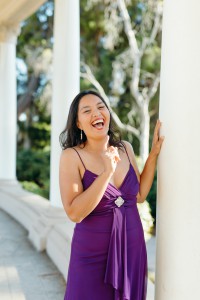
Domenico Scarlatti (1685 – 1757)
Sonata In D Major, K. 96
Robert Schumann (1810-1856)
Faschingsschwank aus Wien (Carnival Jest from Vienna)
INTERMISSION
Franz Liszt (1811 – 1886)
Sonetto 104 del Petrarca
Aprés une lecture du Dante: Fantasia quasi Sonata
Indonesian-born pianist, Ines Irawati is in demand as a solo recitalist, a chamber musician, and a vocal coach. At a young age, she was accepted to the Junior Original Concert, a prestigious music program where young musicians compose original works and perform them around the world. She was invited to the International UNICEF Benefit in Japan, where she performed her concerto with the NHK Symphony Orchestra. Her work for solo flute, “Flirting Belugas”, was published by the Manduca Music Publication.
Her engagements include performances for TEDxSan Diego at Copley Symphony Hall, the Art of Élan, Musikamar chamber concerts, concerts in Centro Cultural Tijuana, and performances all over Southern California. Ms. Irawati has served as the musical and artistic director of San Diego Opera Young Artist Training Program, where she directed the company’s outreach concert series, Opera Exposed!, and its production of Little Red Riding Hood, a children’s opera by Seymour Barab. She was the vocal coach and collaborative piano faculty at Point Loma Nazarene University as well as for the prestigious Institute for Young Dramatic Voices. With singers Josh Arky and Alex Rodrick, Ms. Irawati is involved in La Cena è Pronta, a project which explores the nourishing ways of food and music enrich our lives through intimate vocal performances.
With cellist Sophie Webber, Ms. Irawati released their debut duo album,”Roots: Transcription of Romantic Works for Cello and Piano.” She is a member of the Hidden Valley Virtuosi, the resident chamber music group of Hidden Valley Music Seminars in Monterey, and the Aviara Trio, a piano trio described as the “highest level of instrumental perfection, intensity, passion and expression.” She has collaborated with many esteemed musicians such as violinist Tien-Hsin Cindy Wu, cellist Tanya Tomkins, violinist Jeff Thayer and double-bassist Jeremy Kurtz-Harris.

Volunteer as an usher at the Old Town Temecula Community Theater

Sunday, March 19, 2023, 2:30 p.m.
Gershwin Performing Arts Center | Murrieta Mesa High School
Scott Joplin (1868 – 1917)
Overture to Treemonisha
George Gershwin (1898 – 1937)
Lullaby for Strings
Aaron Copland (1900 – 1990)
Music for Theatre
INTERMISSION
Sherry Williams, voice
John Rodby, piano
Jazz arrangements for chamber orchestra by John L. Rodby (b . 1944)
Bart Howard (1915 – 2004)
Fly Me to the Moon
Robert Wells (1922 – 1998) and Jack Segal (1918 – 2005)
What Are You Afraid Of?
John Klenner (1899 – 1955) and Sam Lewis (1885 – 1959)
Just Friends
Edward Kennedy “Duke” Ellington (1899 – 1974), Irving Mills (1894 – 1985), and Mann Curtis (1911 – 1984)
In a Sentimental Mood
Aloysio De Oliveira (1914 – 1955), Antonio Jobim (1927 – 1994), and Ray Gilbert (1912 – 1976)
If You Never Came to Me
Irving Berlin (1888 – 1989)
Blue Skies
Thanks to the Murrieta Valley Unified School District for their support of this concert.
Concession sales benefit the Murrieta Educational Foundation for the Arts.

Dana Zimbric is marking her 13th season as Artistic Director and Conductor of the California Chamber Orchestra.
In addition to her work with us, she is Music Director of the Classics Philharmonic Orchestra, which performs educational programs for San Diego area students, and recently made her conducting debut with the San Diego Symphony.
Dana’s past conducting experience includes positions with the San Diego Youth Symphony, Avante Chamber Orchestra, Orchestra Nova San Diego, and the University of Wisconsin Chamber and Symphony Orchestras.
An accomplished clarinetist, Dana holds a Bachelor of Music in Clarinet Performance and a Master of Music in Orchestral Conducting from the University of Wisconsin. She lives in San Diego with her husband and two young daughters.
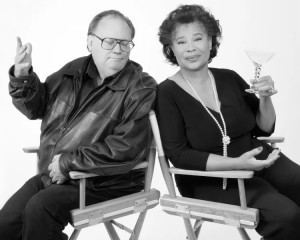
Since she began singing as a professional, Sherry Williams has had the good fortune to rarely be out of work. When she was a high school student in San Bernardino (California), she sang and toured with The Young Americans. At UCLA, she joined the acapella choir and worked with the famous Roger Wagner and the UCLA Choir, both in Los Angeles and Europe. She has also toured with Debbie Reynolds, Andy Gibb, and the legendary Johnnie Ray, to name a few.
In 1976, Sherry left The Eddie Kendricks tour and struck out on her own, touring Indonesia, Singapore, Hong Kong and Bangkok. Since returning to the United States after her last Asian tour in 1980, Sherry has acted in films and on television, has worked extensively in and around the Los Angeles and Denver areas in important jazz venues, nightclubs and festivals, and has recorded three solo CDs and two ensemble CDs. In 1997, she released her first CD, “The Way You Love Me”, to rave reviews. Her second release, “A Taste Of Sherry”, was on the 2003 Grammy ballot and one of the songs was used in the soundtrack of the film THE CORE. After that came “You Must Believe In Spring”, again to rave reviews.
During 2010-2013, Sherry toured Germany and Italy with Markus Burger and Jim Linahon, again working in important concert halls and jazz clubs, including the famed Birdland in Hamburg. These tours have yielded one acclaimed ensemble CD, and two big band CDs, recorded with the Café Nerly Big Band. Sherry has worked with a multitude of jazz greats… Buddy Collette, Herbie Mann, Plas Johnson, “Sweets” Edison, Ann Patterson, Gerald “Wig” Wiggins, Al Viola, Herman Riley, Dave Pike, Eddie Cano, Lanny Morgan, Ross Tompkins, Earl Palmer, Bill Cunliffe, Andy Simpkins, Roy McCurdy, John Leitham, Jennifer Leitham, Ray Pizzi, Jim DeJulio, Paul Smith, Art Hillery, Terry Harrington, John Hammond, Roger Kellaway, Dave Benoit, Llew Matthews, John B. Williams, Tom Ranier, Patrice Rushen, Ralph Penland, Bob Magnusson, Joe LaBarbera….(& many more) SHERRY WILLIAMS is first and foremost a singer – the 14-karat variety.
JOHN RODBY is a commercial musician by vocation and a composer of classical music by avocation. Born in Wahiawa, Oahu, Hawaii, September 14th, 1944, he moved with his family to the Los Angeles area at an early age. Formally educated at Cal State Northridge (1966) and Cal State Long Beach (1968) he did further independent study in composition from Leonard Berkowitz, Donal Michalsky and Albert Harris as well as independent study in piano with Sam Saxe, Ralph Pierce, Peter Hewitt and Julian Musafia. His ‘Concerto for Saxophone and Orchestra’ previously released on Crystal Records was described by Hewell Turcuit in the San Francisco Examiner as ‘casually masterful. Packed with keen notions of sonority’.
Most of Mr. Rodby’s career has been in TV and Film. He was musical director for Dinah Shore for 26 years, Musical Director of the CTW TV show ‘Square I TV’ as well as musical director for two Shari Lewis TV projects; The Shari Lewis TV Show, ‘Lamb Chop’s Sing Along, Play Along’ and ‘Charlie Horse’s Music Pizza’.. He worked further as a keyboardist-arranger for Frank Sinatra, Liza Minelli, Rita Moreno, Tiny Tim and Connie Francis. He also did work on TV shows such as Mitzi Gaynor, Dallas, Bob Newhart, Hart to Hart, Quincy, The Gong Show and X Files. He is currently musical director for Al Martino and arranger- producer- keyboardist for a series of CD’s for Robert Clary and others.
He lives in Woodland Hills with his wife, singer/actress Talya Ferro and continues to compose classical music.
Nicole Sauder (Concertmaster)
Ben Hoffman
Angela Xing
Tommy Dougherty
Sarah Schwartz (Principal)
Margeaux Maloney
Anne Delgado
Steve Huber
Ethan Pernela (Principal)
Linda Piatt
Greg Perrin
Andrew Hayhurst (Principal)
Margaret Tait
Nathan Walhout
Sam Hagar (Principal)
Michael Molnau
Pam Martchev (Principal)
Kathy Oh(Principal)
Ellen Hindson
Max Opferchuk (Principal)
David Savage (Principal)
Darby Hinshaw (Principal)
Jon Hoehne (Principal)
Rachel Allen
Devin Burnworth
Scott Sutherland
Beverly Reese-Dorcy (Principal)
David Whitman
Sonya Schumann

California Chamber Orchestra musicians in this concert are members of
The American Federation of Musicians, Local 325
Our concert kicks off with a pre-jazz composition. American composer Scott Joplin (1868-1917) wrote multitudes of rag-times for piano, yet many are not aware that he also wrote and published an opera called Treemonisha in 1911. The original opera was scored for piano and singers and the composer wrote the original story and libretto. Ahead of its time, the message of Treemonisha is the transformational importance of education in a society. The opera was never performed during Mr. Joplin’s lifetime and received its premier in 1974. The California Chamber Orchestra will perform the Overture to Joplin’s opera arranged for orchestra by composer T.J. Anderson.
Composer George Gershwin (1898-1937) composed Lullaby in 1919 as a composition exercise for his then teacher Edward Kilenyi. The single movement work is built on a lazy syncopated repeated figure, and displays various string colors through pizzicato and high harmonics. Though not a landmark piece like his Rhapsody in Blue or Concerto in F, Lullaby’s delightful lilt is something special. Gershwin originally wrote the piece for string quartet, and then it was later arranged for string orchestra. The delightful piece was first performed publicly some thirty years after Gershwin’s death in 1967.
Aaron Copland (1900-1990) composed Music for the Theatre in 1925. According to music historian Vivian Perlis, Copland was “determined to find an American sound in music… Copland incorporated jazz idioms into his first orchestral pieces, causing scandal in concert halls in the twenties. Music for Theatre was written for small orchestra with no specific play in mind.” Copland described his piece by saying, “the music seemed to suggest a certain theatrical atmosphere, so after developing the idea into five short movements, I chose the title.” The work has five distinct movements: Prologue, Dance, Interlude, Burlesque, and Epilogue. Copland utilizes instrumental colors, jazzy rhythms, and rich harmonies in this challenging work for chamber orchestra.
Today’s concert finishes on a high note with a series of jazz tunes adeptly arranged for chamber orchestra by John L. Rodby. Acclaimed vocalist Sherry Williams and Mr. Rodby join the orchestra, and will share more about each of their selections during the live performance.
The California Chamber Orchestra is grateful to the National Endowment for the Arts and the California Arts Council for their support of this week’s performances for 4th grade students in the Murrieta Valley Unified School District.
— Dana Zimbric
Judy Call
Prudhomme Associates, CPAs
City of Temecula
Leslie and Joseph Waters
Mark Margolin
Nicola Helm & Stephen Ryder
Craig Carper, LaPointe Wealth Management
Murrieta Rotary
Susan & Ken Dickson
Walt Fidler
John Stubbs
Barry Weiss
Rudy Wokoek
Kiyoe MacDonald
John Welniak
Candace Flint
Susan Humphrey
Sarah Ivar
Martha Minkler